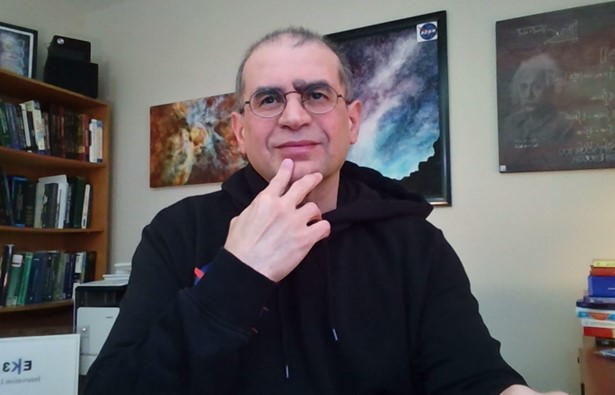 |
Hamada H. Ghenniwa Head of Cooperative Distributed Systems Engineering Group (CDS_EnG) Western University (Retired Professor, 1999 ~2023) Digital Engagement Xperience (President & CEO, 2012 ~ present) |
Outline:
Computing is in a fast paradigm shift as it evolves from “traditional” computation models to Decentralized Intelligent Computation Models (DICM). In DICM, computation can be described as a collective-intelligent behavior that emerges through the behaviors of the individual computing-entities autonomously to solve problems (or achieve individual/collective goals). It can be further described as collective interaction-based computations.
These aspects of DICM are either inherited or highly desirable in a large set of applications that are naturally modeled as decentralized computation problems (DCP), such as smart healthcare and wellness services, smart education, learning, smart manufacturing, supply-chain management, and smart cities, etc.
Unlike the narrow AI, in which intelligent computing models have been restricted to the traditional setting of an individual computing-entity operating in closed environments; the fundamental challenge of DICM settings is related to the collective-intelligent behavior of decentralized computing entities (Agents) in open environments that are able to autonomously act cooperatively, competitively, or exhibit neutral behaviors.
This keynote will present our research direction towards establishing new advancements in theoretical and engineering foundations for collective intelligence computing. The emphasis will be on addressing the foundations of DICM by applying principles of Collective Intelligence, Interaction-based Computations, Artificial General Intelligence, Multi-Agent Reinforcement Learning and Blockchain models.
In this paradigm computation can be carried on a smart cyberspace as a platform of a large society of computing entities (digital, mechanical, biological etc.) as Collective Intelligent Smart Space (CISS) in open environments. In which, the fundamental model of the computing should enable the entities (i) to exercise some degree of authority and autonomy in executing and sharing their capabilities and resources, (ii) to ubiquitously interact with each other collaboratively, cooperatively and/or competitively, (iii) to self-organize, (iv) to learn to improve their capabilities and to learn new ones as well as to increase their degree of autonomy and responsibilities over time, within the context of the society model.
In CISS, new computing entities might be added, others might change, move, or disappear. In this paradigm, the DICM will enable the computing-entities as a whole not only to continue to offer the base collective capabilities, but also strive to improve on and to learn new capabilities.
To meet these challenges, the underlying computing model, software engineering paradigm and technologies must intrinsically inherit the DICM to support intelligence, agility and adaptable composition of the computing capabilities autonomously.
To this end, we are (i) investigating and developing a computing model (Decentralized “Intelligent” Computation Model) that is adequate for DCP; (ii) investigating and developing the fundamental aspects of a CISS -based computing platform; (iii) investigating the practical aspects of developing CISS-based solution for industrial problems, such as Quality of Healthcare Services for Patient Treatment Journey. We carry our research activities in our labs (Distributed Intelligent Systems Lab, Software Engineering Lab, and EK3 Innovation Lab) in collaboration with our partners from both industrial and research institutions to develop sophisticated system architectures, tools and prototypes addressing problems for practical applications that range from mobile physical robots and complex real-time systems, to enterprise integration and collaborative tools, to intelligent manufacturing and supply-chain management, to eLearning and healthcare.
The major findings of our research have been applied for the development of industrial large scale and novel solutions commercialized by spinoff companies of our research group since 2002. The commercial products varied from SaaS based Cloud-computing platform applied for smart manufacturing to media-distribution for location-based marketing and advertising networks. This keynote will share some of the recent commercialization of our core findings through DEX Inc. for mobile fintech, healthcare and super-app marketplace.
Bio:
Dr. Ghenniwa is an academic professor, researcher, and a serial entrepreneur who has co-founded multiple successful companies. Dr. Ghenniwa has more than 35 years of experience in IT services, innovative product development, and deploying large-scale business solutions. He is also internationally renowned for his expertise and academic research as a Professor at Western University, in computational intelligence with a focus on large scale intelligent computing and smart spaces for Grid, Cloud computing and the Internet-of-Smart-Things and their applications to address practical industrial problems. In the year 2000, Dr. Ghenniwa founded and has led the Cooperative Distributed Systems Engineering Group (CDS-EnG) and three Engineering Labs (Distributed Intelligent Systems Lab, Software Engineering Lab, and EK3 Innovation Lab) at the Department of Electrical and Computer Engineering, Western University.
Dr. Ghenniwa’s research and expertise includes theoretical engineering foundations of Intelligent Computing, and Distributed Artificial Intelligence (DAI), with a special focus on the “Agency” computing model, theory of coordination and cooperation applied to decentralized computing problems in open environments. Application areas include electronic and mobile business marketplaces, smart manufacturing and complex real-time systems, smart healthcare and wellness services, smart education and learning, smart cities, etc.
All of our fundamental and applied research projects are conducted and sponsored in collaboration with industrial partners, government, and academic research institutes. Our R&D activities are conducted in our research labs to develop the foundation and engineering principles for sophisticated system architectures, tools and prototypes that range from mobile physical robots to integration and collaborative tools, to intelligent manufacturing and business solutions.
Our research has resulted in over two hundred publications in world-class journals, conference proceedings, technical and industrial project reports. Also, our applied research findings were the basis for five successful spinoff companies mostly co-founded with our graduate and undergraduate students.
Dr. Ghenniwa received a B.Sc. degree (1984) in Computer Engineering from Tripoli (Previously Al-Fateh) University, Tripoli Libya; M.A.Sc. (1991) and Ph.D. (1996) degrees in Systems Design Engineering from the University of Waterloo, Waterloo Canada. He Joined PAMI Lab (1996), University of Waterloo, as a Postdoctoral fellow, then as an Adjunct Assistant Professor. He joined Mackenzie Financial Corporation (1997) as a Senior Knowledge Scientist/Engineer to lead the corporate wide initiative for information systems migration and data-warehouse. He joined University of Western Ontario, Software Engineering, (1999) as an Assistant Professor and was the Director of Software Engineering (2003~2006), he tenured to Associate Professor (2005) and to Full Professor (2012). Since 2002 Dr. Ghenniwa co-founded five successful companies in which he led the businesses at the President/CEO, CTO and CSO levels.



